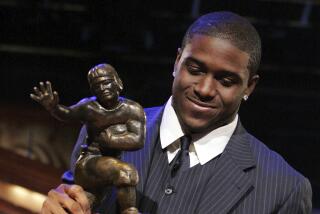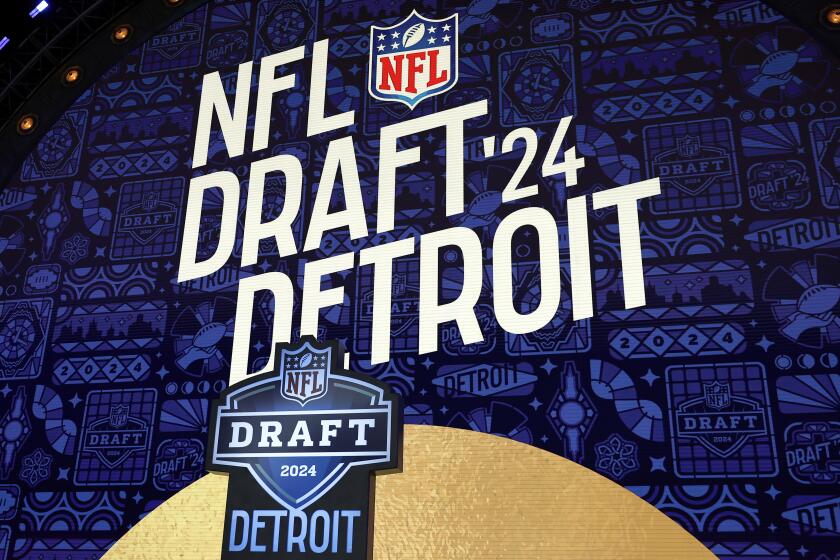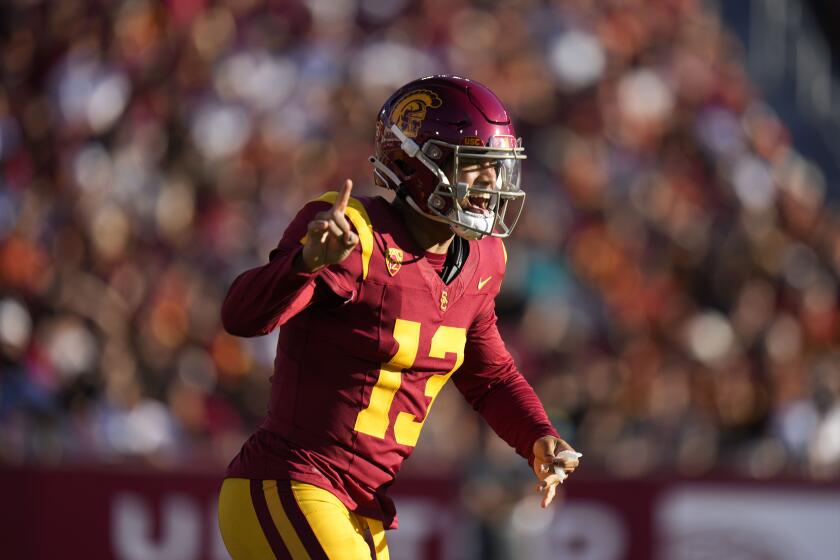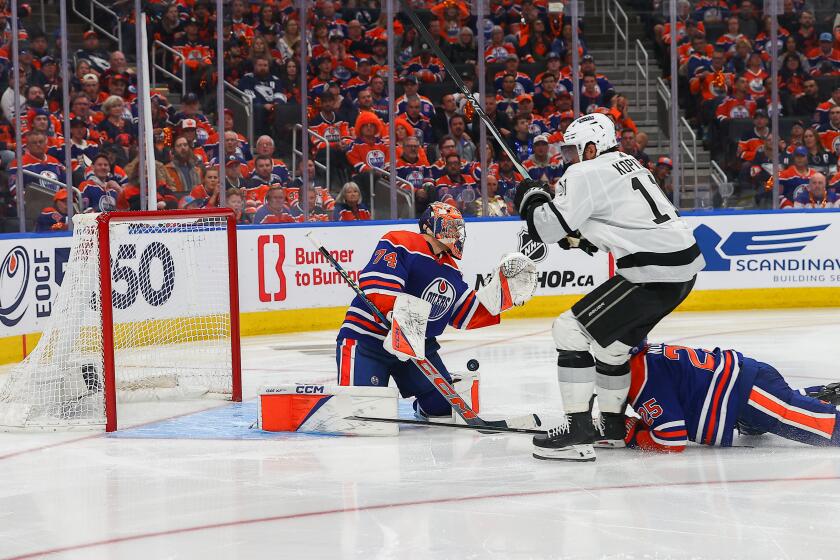Videotaping by Patriots catches the NFL’s eye
The New England Patriots won three Super Bowl titles in four years, building an NFL dynasty in what otherwise was an era of unparalleled competitive balance.
But did a franchise long considered a model of success and efficiency cheat to do it?
That’s the pressing question as details emerge about the Patriots’ breaking league rules by secretly videotaping the defensive signals of the rival New York Jets on Sunday.
In the National Football League, information is relayed to the field from the sideline in much the same way a hitter gets signs from the third base coach in baseball. And, just like in baseball, most football teams use accepted methods -- the naked eye from across the field -- in attempting to break the signal code and steal the signs.
But videotaping coaches on the sideline takes such gamesmanship “to a new low,” said a source from another NFL team who participates in sign stealing. “The way New England is doing it,” he added, “is clearly cheating.”
Deciphering the code -- typically conveyed through a series of hand and body motions -- would allow the Patriots to give valuable information to their offense. New England’s Tom Brady, like every other starting quarterback in the league, wears a radio earpiece to get plays and information from coaches.
On Wednesday, before his regular news conference to discuss the upcoming game against the San Diego Chargers, Patriots Coach Bill Belichick issued a statement on the videotaping matter. He apologized to his team -- although not specifying what he was apologizing for -- and confirmed he has spoken to NFL Commissioner Roger Goodell about the coach’s “interpretation” of rules that ban videotaping of the opposing sideline.
The situation came to light Sunday when NFL security confiscated a video camera from a Patriots employee during Sunday’s game against the Jets, which New England won, 38-14. Matt Estrella, employed by the team as a video assistant, was accused of aiming his camera at Jets defensive coaches as they signaled to players on the field.
Bob Harlan, chairman of the Green Bay Packers, told ESPN that his team’s security guards identified Estrella as the same cameraman who was removed from the sidelines of a game in November against the Patriots at Green Bay’s Lambeau Field. The Patriots won that game, 35-0.
A rival coach, speaking on condition of anonymity, said Patriots quarterback Brady would be at a “huge advantage” if he were to know the coverage scheme called by an opposing defense.
“If a quarterback knows the signal, and if a coach can get on the headset and tell Tom Brady, ‘Oh, by the way, it’s Cover 2,’ Brady’s going to kick their tail,” the source said.
By league rules, teams have 40 seconds between plays, and the coach-to-quarterback communicator clicks off with about 15 seconds remaining. That allows the defense to get its personnel in place and make its pre-snap adjustments.
Reaction around the league was mixed, with some players downplaying the allegations and others saying that, if they are proved, the Patriots should be punished.
In Pittsburgh, wide receiver Hines Ward said he suspected New England also had deciphered the Steelers’ offensive plans during the January 2002 AFC championship game.
“They knew a lot of our calls,” Ward said. “There’s no question some of their players were calling out some of our stuff.”
The Patriots won that game in an upset, 24-17, and went on to win the first in their string of Super Bowls.
“You would hope that during their run, when they were winning all their Super Bowls, all that stuff wasn’t going on,” Ward said. “You look back in the past, and we played them in the championship games, and you kind of wonder. It seemed like they were a step ahead of us at all times. But those games are behind us. There’s nothing we can do about it. You just look forward and see what the commissioner will do.”
Various reports said Goodell was considering sanctions against the franchise, including docking the Patriots future draft picks. A league spokesman said only that an investigation was underway.
In a statement released before his news conference, Patriots Coach Belichick said the league had not notified his team of a final ruling. “Although it remains a league matter, I want to apologize to everyone who has been affected, most of all ownership, staff and players,” he added. “Following the league’s decision, I will have further comment.”
Talking to reporters later, Belichick said he wanted only to talk about the upcoming game. Even so, he was asked several questions about the incident -- including the possible punishment and how the scandal could affect his team -- and declined to answer.
“Any questions about the Chargers?” he asked. “Want to talk about the football game? If not, I think that statement pretty much covers it.”
Eventually, he was asked about the game. But when the subject of the videotape came up again, he abruptly ended the session with, “Is there any other question on the Chargers? OK. Yep. That’s all. OK. Thank you.”
There are no known cases of the NFL punishing teams for spying on opponents. The league reportedly circulated a memo last season that warned of severe penalties for videotaping the signals of opposing teams. It came from Ray Anderson, executive vice president of football operations and declared that “videotaping of any type, including but not limited to taping of an opponent’s offensive or defensive signals, is prohibited.”
In his first year on the job, Goodell has established himself as someone tough on misbehaving players. Atlanta Falcons quarterback Michael Vick was suspended indefinitely for his role in an illegal dogfighting operation, and Tennessee Titans defensive back Adam “Pacman” Jones was suspended for a year after a series of run-ins with law enforcement. But this is the commissioner’s first high-profile test of how he treats a franchise that has broken league rules as opposed to players that have run afoul of the law.
The Patriots have been accused of other underhanded tactics. There have been persistent rumors of New England trying to woo disgruntled players from other teams; conducting unsanctioned workouts of players at the Pro Bowl in February, when the AFC team was coached by Belichick and his staff; violating league rules by allowing players on injured reserve to participate in practice; and paying people to search meeting rooms of the visitors’ hotels for strategic documents -- for instance, it’s fairly typical for a team to script its first 10 to 15 offensive plays, then distribute that list to players the night before a game.
“If they’ve been printed, you can bet the Patriots have them,” one coach said.
But Patriots owner Robert Kraft and others have suggested the rumors and unconfirmed reports are more likely a product of jealousy. In many ways, the Patriots are a model franchise, winning Super Bowls after the 2001, ’03 and ’04 seasons, and -- at $1.18 billion -- ranking second to the Washington Redskins on Forbes magazine’s list of most valuable NFL teams.
“When you’re successful in anything, a lot of people like to try to take you down and do different things,” Kraft said.
Said New England linebacker Chad Brown: “I think that all the facts should come out before people judge this organization. I think we do things the right way.”
Still, several prominent coaches and executives around the league say they would not be surprised if the latest allegations of cheating were true.
“Usually where there’s smoke, there’s fire, so those rumors are founded on something,” Pittsburgh Coach Mike Tomlin told reporters. “No, it’s not totally shocking, no.”
The New York Daily News cited a source saying that Jets Coach Eric Mangini, a former Belichick assistant with the Patriots from 2000-05, used his “insider’s knowledge of Patriots sign-stealing surveillance tactics and shared the . . . secret with members of the Jets organization.” Acting on a tip from the Jets, the newspaper said, NFL security then caught the cameraman.
In a radio interview, former NFL coach Dave Wannstedt said he recalled “a couple of incidents when I was the head coach of the Dolphins, that later on guys told us stories about things happening in the locker room at their facility, and Mickey Mouse stuff that I couldn’t believe.”
Jacksonville Coach Jack Del Rio said that stealing signals is part of football, just like in baseball, but the notion of using a camera dramatically changes the dynamics.
“It’s quite obvious that when you’re signaling defensively, the other bench is like a guy on second base,” Del Rio said. “If the pitcher or catcher is giving away signals, then he can relay things. But that’s part of the game. You’re not talking about having a camera set up on the center field fence that you’re looking and shooting the catcher’s signals and then studying that before you go play that opponent.
“That’s a different issue. Do we look at each other’s sidelines and look for hints at what might be coming? Sure. I think all teams do that. That’s been going on forever. That will continue to be part of our game.”
--
The Associated Press contributed to this report.
More to Read
Get our high school sports newsletter
Prep Rally is devoted to the SoCal high school sports experience, bringing you scores, stories and a behind-the-scenes look at what makes prep sports so popular.
You may occasionally receive promotional content from the Los Angeles Times.







